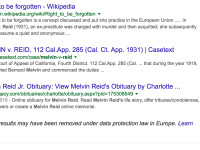The European Union shook up the privacy world in 2014 with the creation of “the right to be forgotten“, creating a system that allows people to seek the removal of search results from Google that are “inadequate, irrelevant or no longer relevant.” The system does not result in the removal of the actual content, but rather makes it more difficult to find in light of the near-universal reliance on search engines to locate information online.
Since the European decision, Google has received nearly 700,000 requests for the removal of links from its search database resulting in the evaluation of 1.8 million URLs. Moreover, privacy authorities in Europe – led by France’s national regulator – have adopted an aggressive approach on the right to be forgotten, ruling that the link removal should be applied on a global basis.
My Globe and Mail op-ed notes that while the Canadian courts have grappled with the question of removing links from the Google search database (a key case on the issue is awaiting a decision from the Supreme Court of Canada), there has been little sense that Canada would establish its own right to be forgotten. That may have changed last week as the Federal Court of Canada issued a landmark ruling that paves the way for a Canadian version of the right to be forgotten that would allow courts to issue orders with the removal of Google search results on a global basis very much in mind.











